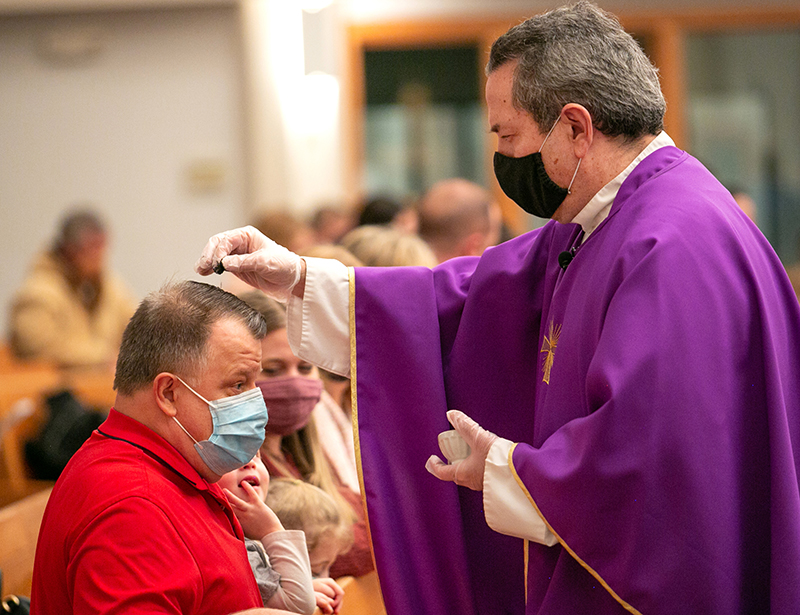Paul Moore: Ash Wednesday heavenly freckles and the smudge of contrition

Father Joe Hogan distributes ashes 2021 sprinkle-safe style to Dr. Kevin Gray during an evening Ash Wednesday Mass Feb. 17 at Our Lady of the Lake Church in Mahomet. (For The Catholic Post/Greg Taylor Photography)
In My Father’s House / Paul Thomas Moore
My daughter Sarah did her post-graduate studies in Ireland, and she mentioned something she’d noticed there on Ash Wednesday. Her friend Ruth had come into the classroom (ironically, in Hebrew the name Ruth means “friend”), and Sarah greeted her with a nod and smile. However, Sarah did a double take when she noticed Ruth was sporting a prominent ash mark on her forehead.
Not having attended parochial school, Sarah was not accustomed to seeing the ashes on full display in public — particularly by young people. She was impressed that Ruth’s attitude was quite matter of fact regarding her faith witness within the secular island of the university. Irish Catholics aren’t shy about their faith.
By contrast, Ash Wednesday 2021 has been more comfortable for the circumspect. Instead of the traditional tracing of the cross with ashes on the forehead, this year’s COVID protocol called for the ashes to be sprinkled on the head of the penitent. (I can imagine there may have been a few interesting stand-offs between tall parishioners and short priests trying to reach up in order to sprinkle down).
In another COVID precaution this year, in many parishes we didn’t individually hear the priest say, “Remember that you are dust, and to dust you shall return.” Instead, the priest made a general invocation to the congregation before we went up to receive the ashes.
Personally, I find it powerful either way — whether those always sobering-words, or the utter silence as he sprinkles — much as when relatives toss soil on a deceased loved one’s casket in a final quiet good-bye. At such times, silence resounds.
FEWER DISTRACTIONS THIS YEAR
Paradoxically, Ash Wednesday reminds me — as funerals do — that I am still very much alive. I have time to get my act together. To that point, while the more common Ash Wednesday invocation offered by the priest is, as mentioned above, “Remember that you are dust . . .”, the priest may also opt for a fairly blunt alternative: “Repent and believe in the Gospel.”
This Ash Wednesday as well, I wasn’t as distracted from the meaning of the moment by silly insecurities such as whether Father was trying to tell me how big a sinner I am by the size and darkness of my cross. Neither was I quite as tempted while proceeding back to my pew after receiving ashes to peek at the foreheads of others — or to surreptitiously notice if they were peeking at mine.
The spiritual sprinkling was kind of like the “air hug” we are all getting so used to receiving in social settings during COVID times.
Naturally, the sprinkling of the ashes did leave some margin for error with some particles landing on the nose and face, but I found the effect more like heavenly freckles than the smudge of contrition.
I’m looking forward to next year, when hopefully the forehead cross returns in all it’s gray, gritty glory, but for now, the spiritual sprinkling was kind of like the “air hug” we are all getting so used to receiving in social settings (after COVID, we’re all going to have to take hug re-training).
FRUITFULNESS THROUGH DYING
As we know, it doesn’t really matter how the ashes are given. What’s important is the spirit in which they are received. The reality is in the blessing, not the form it takes — and the flow of the blessing is not meant to stop with us.
We are urged by the Holy Spirit to be fruitful and multiply . . . “whatever is true, whatever is honorable, whatever is just, whatever is pure, whatever is lovely, whatever is gracious…” (Philippians 4:8)
Mother Teresa wasn’t a natural mother, but her love was extremely fruitful, and as she said, “We are not called to be successful, but faithful.”
The author Henri Nouwen (who had met Mother), echoed that when he reminded us of the difference between being “fruitful” and being “successful.”
He noted that a fruitful life continues to give after it’s gone.
Indeed, as with Christ, sometimes the full fruitfulness is only possible through dying — and that’s what Ash Wednesday is all about.
—
 PAUL THOMAS MOORE is a Catholic commentator and singer-songwriter. He and wife Mary Louise attend St. Mary of Lourdes in Germantown Hills. He can be reached at paulthomasmoore@hotmail.com.
PAUL THOMAS MOORE is a Catholic commentator and singer-songwriter. He and wife Mary Louise attend St. Mary of Lourdes in Germantown Hills. He can be reached at paulthomasmoore@hotmail.com.





